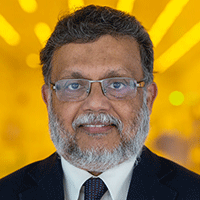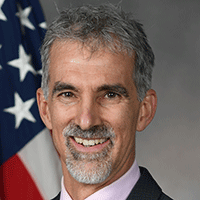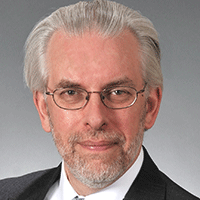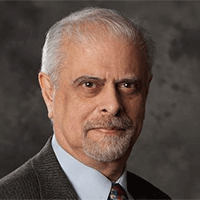
Anthony M. Waas
Fulton Professor of Aerospace and Mechanical Engineering
Director, School for Engineering of Matter, Transport and Energy
Fulton School of Engineering
Arizona State University
Presentation Title: The Effects of Favorable Geometric Perturbations in Controlling the Collapse Response of Thin-walled Shell Structures
Abstract: This work investigates how favorable geometric perturbations can be leveraged to control the collapse response of thin-walled shells—structural elements widely utilized in aerospace, civil, and naval engineering. The study considers thin-walled cylindrical shells under axial compression and spherical shells exposed to external pressure. It is well established that geometric imperfections—or unfavorable geometric perturbations—can dramatically reduce the collapse strength of these structures. Due to the inherent instability in their postbuckling response, structural designers traditionally resort to knock-down factors, limiting maximum allowable loads to ensure safety.
However, this conservative approach raises a pertinent design question: Can intentionally introduced favorable geometric perturbations yield shells with more predictable, controllable deformation paths and with less variability in their maximum collapse pressure? For spherical shells, our studies demonstrate that introducing outward-pointing (rather than inward) dimple perturbations can enhance collapse resistance under external pressure, designating these as favorable configurations. In the context of cylindrical shells, the postbuckling reserve capacity known from plate structural mechanics is exploited: polygonal prismatic shells (plate-shells) are proposed and analyzed, combining both plate-like and shell-like characteristics. The results show that these plate-shells exhibit relative insensitivity to geometric imperfections over a range of designs and sustain collapse loads that exceed those of conventional circular cylindrical shells.
These findings represent a significant shift from the commonly reported imperfection sensitivity dominating the collapse behavior of spherical shells under external pressure and axially compressed cylindrical shells. The research suggests a pathway towards designing shell structures with more robust, predictable collapse responses, which could influence future standards and safety margins in engineering practice.
Biography: Anthony M. Waas, Fulton Professor of Aerospace and Mechanical Engineering is the Director of the School of Engineering for Matter, Transport, and Energy (SEMTE) at Arizona State University. SEMTE encompasses the Aerospace, Mechanical, Materials, Bio, and Chemical Engineering programs. His current research robotically manufactured lightweight thin-walled structures—including in-space fabricated structures—computational modeling of composite aerostructures, damage tolerance of composites, affordable textile composites, hydrogen storage for mobility, and data science applications in materials and structural modeling.
Professor Waas served as the Felix Pawlowski Collegiate Chair and Department Chair, Professor of Aerospace Engineering, and Director of the Composite Structures Laboratory at the University of Michigan from 1988 to 2014. In January 2015, he joined the University of Washington as Chair of the Aeronautics Department and the William Boeing Endowed Professor. He is a Fellow of the American Institute of Aeronautics and Astronautics (AIAA), American Society of Mechanical Engineers (ASME), American Society for Composites (ASC), American Academy of Mechanics (AAM), and the Royal Aeronautical Society, UK.
He has received numerous awards including multiple best paper honors, the 2016 AIAA/ASME SDM National Award, the AAM Junior Research National Award, and the ASC Outstanding Researcher International Award. In 2017, he was honored with the AIAA-ASME-ASC James H. Starnes Jr. Award for seminal contributions to composite structures and materials, as well as for mentoring students and young professionals. Professor Waas was elected to the Washington State Academy of Sciences in 2017 and to the European Academy of Sciences and Arts in 2018.
Further distinctions include the AIAA ICME Prize (2020), ASME Warner T. Koiter Medal (2020), the AIAA Dryden Lecture in Research, and membership on the US National Academy of Engineering’s Aeronautics and Space Engineering Board since 2021. Most recently, he received the CT Sun Medal from the American Society of Composites in September 2023 and the 2025 ASCE Raymond D. Mindlin Medal recognizing his lifelong contributions to aerospace composite structures.

Dr. Greg Reich
Director of the Multidisciplinary Science & Technology Center
Air Force Research Laboratory
Presentation Title: Next Generation Structures and Structural Design
Abstract: Modern aircraft require unique, highly integrated structures to achieve their desired mission objectives. Multi-scale multi-physics models that capture complex behavior are necessary to correctly predict the performance of these structures in their operating environment. As design complexity goes up, numerical optimization techniques are required to help the designer determine feasible and then more advantageous designs in the design space. This talk will address some of the recent work in the Air Force Research Laboratory in these areas, and hopefully motivate future research and innovation by the larger community.
Biography: Dr. Reich is currently the Director of the Multidisciplinary Science & Technology Center (MSTC) in the Aerospace Systems Directorate, Air Force Research Laboratory. He leads a team of government and contract researchers in fundamental and applied research in multi-fidelity design of aircraft systems, focusing on the use of system Measures of Effectiveness as objectives in the multidisciplinary analysis, design, and optimization process.
From 2020-2023, he served as the Principal Scientist of the Aerospace Vehicles Division, with responsibility for the overall health and strategic guidance of the division’s basic and applied research competencies. From 2016-2020, Dr. Reich was Tech Area Lead in MSTC conducting fundamental and applied research in conception, design, system integration, and testing of adaptive structures and multidisciplinary technologies across a range of physical scales.
Dr. Reich is a Fellow of AFRL, AIAA, and ASME. He is Chair of the 2026 Gordon Research Conference on Multifunctional Materials and Structures, and previously chaired the SPIE Smart Structures & NDE Conference and the AIAA Adaptive Structures Conference. Dr. Reich is a past Chair of the AIAA Adaptive Structures Technical Committee and served as an Associate Editor of the Journal of Intelligent Material Systems & Structures from 2010-2023. He has served on advisory boards for DoD research groups, academic departments and projects, and NASA.
Dr. Reich received a Bachelor's degree from Georgia Tech in 1992, a Master's degree from MIT in 1994, and a PhD from the University of Colorado in 2000, all in Aerospace Engineering.

Dr. Peter Matic
Associate Director of Research
Naval Research Laboratory
Presentation Title: The Naval Research Laboratory: Science and Engineering for Seapower and the Nation
Abstract: The Naval Research Laboratory (NRL) is the corporate research laboratory of the U.S. Navy and Marine Corps. Its mission is to conduct a broad-based program of scientific research and advanced technology development that serve as a foundation for delivering new capabilities for national defense. NRL’s 1700 scientists and engineers cover a wide range of disciplines pursuing long-term breakthroughs and near-term advances. NRL began its service to the nation in 1923. The 2023 centennial provided a unique opportunity to reflect on the evolution of a complex organization and its contributions. Its inaugural work focused on radio and underwater sound. As science, engineering and world events evolved over the decades, NRL added new staff and research capabilities in emerging and important areas including materials, chemistry and electronics. Recent thrusts have been established in biotechnology, nanoscience, autonomy and quantum science.
This presentation will discuss NRL's organization, staffing and business model; its culture of multidisciplinary research and development; and the importance of collaboration with academia, industry, government. It will highlight historical points of reference that shaped the laboratory and discuss examples of fundamental research and its impact on technology, the Naval services and the nation.
Biography: Dr. Peter Matic is the Associate Director of Research for the Materials Science and Component Technology Directorate at the U.S. Naval Research Laboratory (NRL) in Washington, DC. His responsibilities include the technical direction, financial management and administration of over 500 scientists, engineers and staff conducting multidisciplinary research and technology development. The Directorate's work covers materials, chemistry, biomolecular sciences, plasma and laser physics, electronics and fluid dynamics for the Navy, the Marine Corps and other government agencies. He is also the Materials and Chemistry Focus Area Coordinator for the NRL Base Research Program.
He has led or conducted work on the biomechanics of blast and impact; body armor and infantry combat equipment; deformation, damage and fracture of materials and structures; mathematical and computational strategies to model complex materials and systems; integrated use of experimental data and computational simulations; multifunctional structure-energy composite materials and components; and submarine and surface ship structural integrity.
He received a B.S. in Mechanical Engineering from Illinois Institute of Technology and a Ph.D. in Applied Mechanics from Lehigh University. Early in his career, he worked at the Electric Boat Division of the General Dynamics Corporation. He has also taught undergraduate and graduate courses at George Washington University.

ASME Spirit of St. Louis Medal Lecture
Azad M. Madni, NAE, ASME Honorary Member
University Professor, Astronautics, Aerospace and Mechanical Engineering Northrop
Grumman Foundation Fred O’Green Chair in Engineering
Executive Director, Systems Architecting and Engineering Program
University of Southern California
Presentation Title: Intelligent Decision Aiding In Space-based and Airborne Systems
Abstract: This lecture traces my aerospace career trajectory, highlighting key technical accomplishments and lessons learned. I will cover my early contributions to NASA's Space Shuttle Orbiter navigation system, followed by my innovations in AI-enabled tactical decision aiding of fighter aircraft under Navy, DARPA, Air Force, and Northrop research sponsorship. Central to this research is the importance of cross-disciplinary engineering which enabled bridging AI with traditional aircraft functions and subsystems to create new capabilities. I will then pivot to my ongoing research in human-AI teaming and augmented intelligence through a real-world example. I will describe a novel experimentation testbed appropriately instrumented to evaluate human-AI teaming options for both nominal and contingency scenarios. I will then present the highlights and transdisciplinary foundations of the aerospace systems engineering education program that I direct. The lecture will conclude with a forward-looking analysis of the impact of AI/ML on future aerospace platforms and systems.
Biography: Dr. Azad Madni is a world-renowned aerospace systems engineer specializing in transdisciplinary engineering/education, augmented intelligence, and machine learning technologies for aerospace systems. He has had an extraordinarily successful career in both industry and academia spanning more than five decades. A member of the National Academy of Engineering, he received his Ph.D., M.S., and B.S. degrees in Engineering from UCLA. He is also a graduate of AEA/Stanford Executive Institute.
He pioneered the field of transdisciplinary systems engineering (TSE) and its companion engineering education framework, TRASEE™. For these innovations, the NAE honored him in 2023 with its prestigious Bernard M. Gordon Prize for Innovation in Engineering and Technology Education. In the same year, the IEEE honored him with its prestigious IEEE Simon Ramo Medal, the highest honor in systems engineering and systems science. In 2026, he received the ASME's prestigious Spirit of St. Louis Medal.
He has received the highest honors and awards in Aerospace Engineering including AIAA Honorary Fellow, AIAA/ASEE John Leland Atwood Award for outstanding contributions to aerospace engineering education, IEEE Aerospace and Electronic Systems (AESS) Pioneer Award, IEEE AESS Judith A. Resnik Space Award, IEEE AESS Industrial Innovation Award, IEEE Systems Man and Cybernetics Norbert Wiener Award for outstanding research in systems engineering and systems science, and the National Defense Industrial Association's Lt Gen Thomas R. Ferguson Award for Systems Engineering Excellence.
He has received the highest awards and honors in multiple engineering disciplines, including Computer Science (ACM Fellow), Mechanical Engineering (ASME Honorary Member, ASME CIE Leadership Award, and ASME CIE Lifetime Achievement Award), Systems Engineering (INCOSE Life Fellow, Pioneer Award, Founders Award, Benefactor Award, Lifetime Achievement Award), Electrical Engineering (IEEE Life Fellow), Industrial Engineering (IISE Fellow), Biomedical Engineering (AIMBE Fellow), and Manufacturing Engineering (SME Fellow). He is a life member of the Phi Kappa Phi honor society, and Omega Alpha Association, an international systems engineering honor society.
He has received the University of Southern California's highest honors, including the Associates Award for Creativity in Research and Scholarship, and the Associates Award for Excellence in Teaching. For his lifelong commitment to philanthropy and mentorship, he has been honored by the NAE, INCOSE, IEEE-USA with their highest honors and awards. In 2025, he received the Society of Women Engineers Rodney D. Chipp Memorial Award for championing and mentoring women engineers for more than 30 years.
He is the author of the award-winning book, Transdisciplinary Systems Engineering (Springer, 2018), co-author of Tradeoff Decisions in System Design (Springer, 2106), and co-author of Deep Learning: Design, Development, and Deployment (Springer, 2023). He is a guest editor of the special issue on "Green Learning for Multimedia Computing" in the ACM Transactions on Multimedia Computing, Communications, and Applications. He is the EIC/editor of nine engineering volumes including the Handbook on Model Based Systems Engineering (Springer, 2023), and the Springer series in Systems Engineering Research.